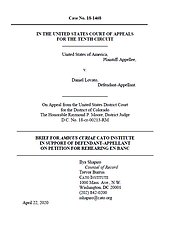The guidelines, like regulations issued by federal agencies, are legally binding. Judges have usually deferred to the commentaries on the guidelines, giving almost authoritative weight to the commission’s interpretations. But that type of deference was altered by the recent Supreme Court opinion in Kisor v. Wilkie. Lovato has challenged his sentence in the Tenth Circuit, asking that the court rehear the case en banc (meaning every judge on the circuit will hear the case rather than the typical three-judge panel) and arguing that the deference given to the commentaries was unwarranted in the wake of Kisor.
In Kisor, the Court paired down the deference that courts give to agencies when they interpret their own regulations. Deference to the Sentencing Commission’s commentaries is exactly that kind of deference and must be similarly restricted. Kisor said that courts should look to agency interpretations only if the regulations really are ambiguous. Past courts didn’t look for ambiguity in the sentencing guidelines before deferring to the commentaries, so Kisor makes them outdated. Furthermore, the guidelines are not ambiguous as to whether prior crimes of violence include all attempts—they don’t. That, not the commentaries, should decide this case.
The district court followed the commentaries in sentencing Lovato, and a three-judge panel decision in the Tenth Circuit upheld the district court based on outdated Tenth Circuit and Supreme Court doctrine. Lovato is asking the Tenth Circuit to bring its approach to this issue in line with current Supreme Court guidance.
Cato has filed an amicus brief supporting Lovato’s petition for rehearing en banc. If the panel decision and district court are not overturned, American citizens will continue to spend additional years in prison on the basis of interpretations that are not law. The Tenth Circuit should take this opportunity to make clear that the protections which the Supreme Court has outlined against this kind excessive deference will be respected by the lower courts.




